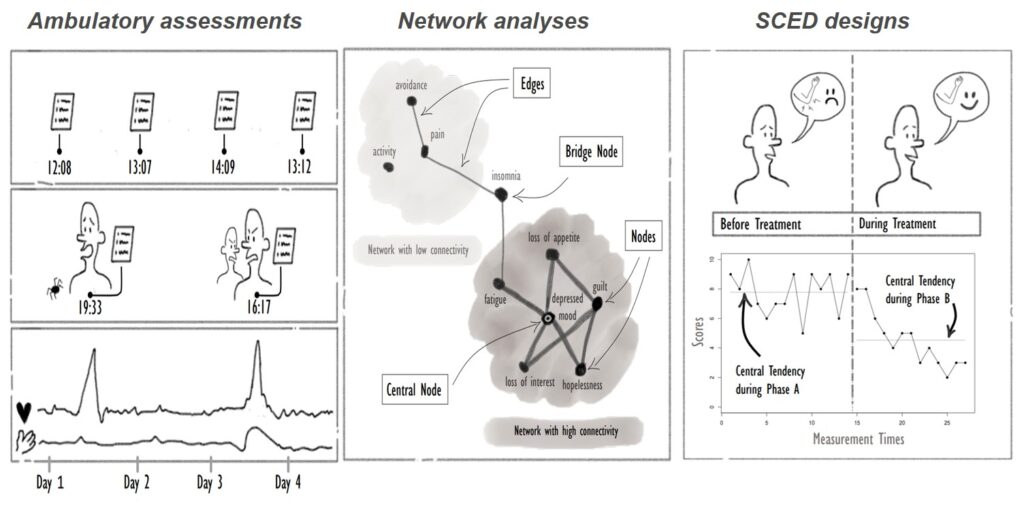Rigorous and flexible research designs? Although this sounds like a contradiction, it is exactly what we need. Methodological rigor in terms of reliability, validity, and generalizability. Flexibility in terms of adaptation to different individuals seeking help at varying psychotherapy contexts.
As clinical psychotherapists, we know about the dilemma that traditional research methods pose for everyday clinical practice. Most of the research findings are based on group designs with patients being classified based on diagnostic systems. While results of these designs allow to draw conclusions about anticipated treatment effects for some sort of hypothetically existing patient, they might not necessarily apply to the patient sitting in front of you.
Contemporary research designs, namely ambulatory assessments (AA), network analyses (NA), and single-case experimental designs (SCED), could potentially advance idiographic and nomothetic psychotherapy research and practice. Our aim was to contribute to the dissemination of these methods. We also hoped to stipulate ideas how these approaches can be combined (with each other or with traditional group designs) to further increase methodological rigor and flexibility.
For this purpose, we systematically reviewed existing methodological publications critically evaluating these methods. We then invited methodological and clinical experts to participate in a subsequent Delphi study to condensate their most essential advancements and challenges for psychotherapy research and practice.

Methodological and clinical experts agreed on several advances. For example, AA was considered particularly promising in disengaging within- and between-psychological processes, NA appears to be valuable for conceptualizing interacting symptoms, and SCED is a promising tool for providing initial proof of principles.
The present results help to set the agenda for future research. There was an urgent call for high-quality measurements, investigation of temporal patterns and systematic influences on compliance rates, and generation of recommendations for methodological decision-making.
For clinical practice, reviewed approaches were believed to improve treatment delivery, e.g. by enabling clinicians to systematically evaluate their clinical practice and advancing idiographic case formulations. Yet, there was consensus that future efforts need to minimize technical barriers and develop an automated and user-friendly implementation apparatus to aid decision making and improve treatment delivery in everyday clinical practice.
We urge clinical researchers to consider these recommendations so that practitioners are empowered to become true scientific-practitioners. Allowing practitioners to tailor and personalize their treatment, flexibly and rigorously.
TARGET ARTICLE
Schemer, L., Glombiewski, J. A., & Scholten, S. (2023). All good things come in threes: A systematic review and Delphi study on the advances and challenges of ambulatory assessments, network analyses, and single-case experimental designs. Clinical Psychology: Science and Practice, 30(1), 95–107. https://doi.org/10.1037/cps0000083
DISCUSSION QUESTIONS
- How can the described methods be combined with traditional group designs, e.g., to get a better understanding of individual and general psychological processes?
- In which ways could the described methods be combined with each other, e.g. to capture treatment effects on dynamic and interacting symptoms?
- What are the next steps to overcome identified barriers to the dissemination of the described approaches?
- How can we use the described methods in a meaningful way for clinical practice?
ABOUT THE AUTHORS
 Dr. Lea Schemer is a postdoctoral research fellow at the University Koblenz-Landau. She is currently exploring methods such as ambulatory assessments and single-case experimental designs in search of better tools to assess treatment processes in chronic pain samples with the ultimate goal of improving the impact of treatment. Dr. Schemer can be contacted at schemer@uni-landau.de
Dr. Lea Schemer is a postdoctoral research fellow at the University Koblenz-Landau. She is currently exploring methods such as ambulatory assessments and single-case experimental designs in search of better tools to assess treatment processes in chronic pain samples with the ultimate goal of improving the impact of treatment. Dr. Schemer can be contacted at schemer@uni-landau.de
 Prof. Dr. Julia Anna Glombiewski is a full-time professor at the University Koblenz-Landau. As a clinical researcher, licensed clinical psychologist, and CBT supervisor, her goal is to contribute to the development of better treatments for chronic pain and other psychological disorders such as OCD and depression. Prof. Dr. Glombiewski can be contacted at glombiewski@uni-landau.de and you can follow her on Twitter at @glombiewski
Prof. Dr. Julia Anna Glombiewski is a full-time professor at the University Koblenz-Landau. As a clinical researcher, licensed clinical psychologist, and CBT supervisor, her goal is to contribute to the development of better treatments for chronic pain and other psychological disorders such as OCD and depression. Prof. Dr. Glombiewski can be contacted at glombiewski@uni-landau.de and you can follow her on Twitter at @glombiewski
 Dr. Saskia Scholten is a postdoctoral research fellow at the University Koblenz-Landau. She aims to understand and support clinical decision-making processes. For that reason, she is currently looking into the value of the network approach to potentially improve psychotherapist trainings. Dr. Scholten can be contacted at scholten@uni-landau.de and you can follow her on Twitter at @saskiane_s
Dr. Saskia Scholten is a postdoctoral research fellow at the University Koblenz-Landau. She aims to understand and support clinical decision-making processes. For that reason, she is currently looking into the value of the network approach to potentially improve psychotherapist trainings. Dr. Scholten can be contacted at scholten@uni-landau.de and you can follow her on Twitter at @saskiane_s
